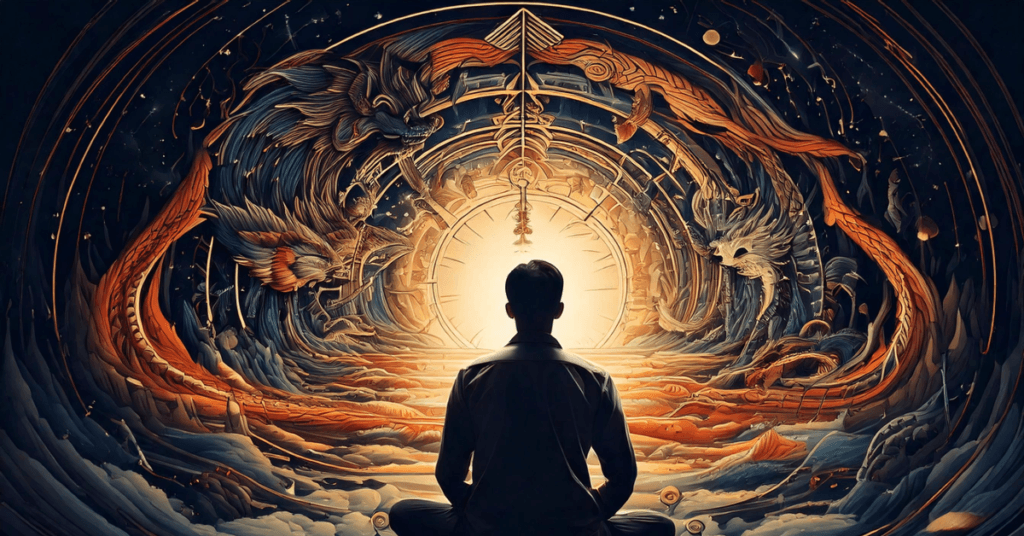What is the Meaning Crisis?
“The world is changed. I feel it in the water. I feel it in the earth. I smell it in the air. Much that once was is lost, for none now live who remember it.”
— Galadriel, Prologue to Peter Jackson’s The Lord of the Rings*
Galadriel’s words from The Lord of the Rings evoke a world in decline, where the deep and sacred meaning of life has faded into memory. In many ways, this mirrors our own reality today. Despite extraordinary technological advancements and unprecedented material wealth, modern society is suffering from a meaning crisis—a profound loss of purpose and fulfillment. In our relentless pursuit of progress, we have unintentionally destroyed the very structures that once gave life meaning. This crisis has left individuals disconnected, communities fragmented, and our relationship with the Earth in disrepair. But, as with Frodo’s journey, there is a way forward: through self-transcendence, we can rediscover purpose by connecting to something greater than ourselves.
This article explores how the forces of modernity—individualism, consumerism, and technological advancement—have eroded our sense of purpose and contributed to the meaning crisis. More importantly, it offers self-transcendence as the antidote: the path by which we can reclaim purpose by reconnecting to community, mythology, rituals, and the Earth itself.
The Paradox of Progress: How We Lost Meaning in the Pursuit of Advancement
At the heart of the meaning crisis lies a paradox: the very progress that was supposed to improve our lives—through technological advancement, individual freedom, and material success—has led to an erosion of the structures that once grounded us in meaning. Like Gollum madly pursuing his Precious, the more we chase after progress, the more disconnected and meaningless our lives become.
In The Lord of the Rings, Sauron’s unquenchable thirst for power destroyed everything he sought to control, leaving a broken and hollow Middle-earth in his wake. Similarly, modernity’s pursuit of constant growth and progress has undermined the spiritual and communal foundations that once anchored human life in purpose. We have lost sight of the essential truths that give our existence meaning—truths found in shared myths, cultural traditions, and a sense of belonging to something greater than ourselves.
The Suffering Caused by the Meaning Crisis: A World Adrift
The effects of this meaning crisis are palpable. While we may have conquered new frontiers in medicine, communication, and industry, the cost has been a world that is more disconnected and fragmented than ever before. This crisis is not just philosophical; it is at the root of much of the suffering we see in the modern world.
1. Mental Health: An Epidemic of Isolation and Despair
“I feel thin, sort of stretched, like butter scraped over too much bread.”
— Bilbo, The Fellowship of the Ring
We are living in an era where mental health issues—from anxiety to depression to substance abuse—are at unprecedented levels. Despite improvements in living conditions, life expectancy, and technological connectivity, people feel more isolated and disconnected than ever. Social media, for instance, creates the illusion of connection but often results in feelings of loneliness and inadequacy.
In The Lord of the Rings, Frodo carries the burden of the One Ring, a symbol of power that brings only torment and isolation. Today, many individuals carry the burden of modernity’s hollow promises—material success, endless productivity, and superficial connection—only to find themselves increasingly alienated. The rise of mental health crises reflects this deep spiritual void: a world that gives us everything except what we most need—a sense of meaning.

2. Social Fragmentation: The Breakdown of Community
“You can trust us to stick to you through thick and thin—to the bitter end. And you can trust us to keep any secret of yours—closer than you keep it yourself. But you cannot trust us to let you face trouble alone, and go off without a word. We are your friends, Frodo.”
— Merry, The Fellowship of the Ring
Along with individual suffering, we see the breakdown of social bonds. Traditional community structures that once provided a sense of belonging and collective purpose have been eroded by the rise of hyper-individualism. People are encouraged to forge their own path, but in doing so, they often lose the communal frameworks that once gave life meaning.
In Tolkien’s world, it is only through the unity of the Fellowship—a collective mission to protect Middle-earth—that Sauron is defeated. In contrast, modern society’s pursuit of individual autonomy has fractured the bonds that once united families, communities, and societies. The result is a fragmented world where people are left to navigate the complexities of life alone, without the support of rituals, traditions, or shared values that once provided a sense of communal purpose.
3. Environmental Destruction: The Moral Consequences of Consumerism
Perhaps the most tangible result of the meaning crisis is the environmental devastation caused by consumerism. As people turn to material goods and experiences to fill the void left by the absence of deeper meaning, the Earth suffers. Rampant consumption, driven by an insatiable hunger for more, has led to the destruction of ecosystems, the depletion of natural resources, and the acceleration of climate change.
In our quest for more, we have forgotten our role as stewards of the Earth. Like Sauron’s destruction of Middle-earth in his pursuit of power, our exploitation of the planet is a reflection of our disconnection from nature and our failure to recognize the interconnectedness of all life. The climate crisis is not only an environmental problem but a moral one, born from humanity’s failure to find purpose beyond material accumulation.
“Many of those trees were my friends, creatures I had known from nut and acorn; many had voices of their own that are lost forever now. And there are many voices in the hills that are crying out of pain and not answering. The treeless hills, the scorched earth… it is a black time.”
— Treebeard, The Return of the King
The Path Forward: Self-Transcendence as the Antidote to the Meaning Crisis
While the meaning crisis is profound, there is a way out: self-transcendence—the process of finding meaning by connecting to something beyond oneself. Self-transcendence is the ultimate antidote to the isolation and fragmentation of modern life, offering a path to reconnection with community, culture, mythology, and the Earth.
1. Rediscovering Rituals: Building Structure and Belonging
In the face of modern disconnection, rituals offer a way to reconnect with meaning. Rituals—whether religious, cultural, or personal—create moments of reflection, celebration, and continuity in an otherwise chaotic world. By reintroducing meaningful rituals into our lives, we can cultivate a sense of belonging and shared purpose.
Like the ceremonial gatherings in The Lord of the Rings, where the peoples of Middle-earth unite to face a common threat, modern rituals—whether they are family traditions, communal gatherings, or personal practices—offer us a way to rebuild the communal bonds that have been lost, shore up our collective strength, and face our challenges.
Learn more about how rituals can help us find meaning here: The Transformative Power of Rituals: A Path to Meaning, Connection, and Healing
2. Engaging with Mythology: Stories That Guide Our Lives
Mythology has always played a central role in guiding human behavior and providing a narrative framework for life. From ancient origin stories to modern super heroes, these narratives help us make sense of our struggles and triumphs, our sense of identity, and give us archetypes to follow. In today’s world, myths—like Tolkien’s tales of heroism and sacrifice—can inspire us to see ourselves as part of a larger story, one where our actions have meaning and purpose beyond personal gain.
Myths remind us that we are not alone in our quest for meaning. By embracing archetypal stories and the lessons they offer, we can reframe our own lives as part of a larger narrative, one that connects us to the past and to the future.
Learm more about how mythology can help us find meaning here: How Mythology Guides Modern Life: Life Lessons from Mythology, Religion, and Modern Stories
3. Reviving Cultural Traditions: Strengthening Social Bonds
Cultural traditions are powerful tools for fostering connection and building community. In an age where individualism reigns, reviving or creating new cultural practices can provide a sense of collective identity. Whether through festivals, rites of passage, or community service, these traditions help people feel connected to something greater than themselves.
Just as the Fellowship in The Lord of the Rings draws strength from their collective mission, we can find strength in participating in shared traditions that foster social cohesion. By engaging in cultural practices that transcend individualism, we can rebuild the social fabric that has frayed in the modern world.
4. Embracing Stewardship: Finding Purpose Beyond the Self
Finally, self-transcendence invites us to recognize our responsibility to the Earth and all of humanity. By embracing stewardship, we acknowledge that our lives are interconnected with the natural world and that we have a duty to protect it. Acts of conservation, mindful consumption, and re-engagement with nature can restore a sense of purpose that goes beyond material gain.
In Tolkien’s world, the fate of Middle-earth depends on the courage of those who act for the greater good. In our world, the fate of many species rests on our ability to move beyond self-interest and recognize that true meaning comes from serving a purpose larger than ourselves.
Conclusion: Self-Transcendence and the Rebirth of Meaning
“Some believe it is only great power that can hold evil in check. But that is not what I have found. I found it is the small everyday deeds of ordinary folk that keep the darkness at bay. Small acts of kindness and love.”
— Gandalf, The Hobbit
The meaning crisis may seem overwhelming, but there is a clear path forward. By embracing self-transcendence—by reconnecting with community, culture, mythology, rituals, and the Earth—we can rediscover the purpose that modernity has stripped away. Just as Frodo’s journey to destroy the Ring was about more than personal glory, our journey to resolve the meaning crisis must be about more than individual success. It must be about reconnecting with what is timeless, what is sacred, and what unites us all.
In doing so, we will not only heal ourselves and our communities but also ensure that we leave the world a better place for future generations. The crisis of meaning is profound, but so too is the opportunity for self-transcendence—the ultimate antidote to our age of disconnection.



